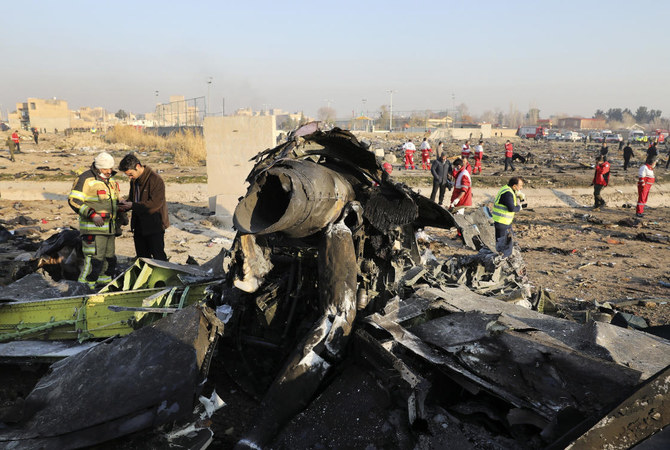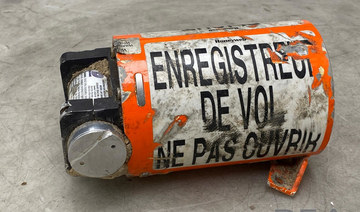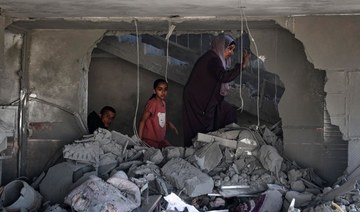TEHRAN, Iran: Iran has retrieved some data, including a portion of cockpit conversations, from the Ukrainian jetliner accidentally downed by the Revolutionary Guard forces in January, killing all 176 people on board, an Iranian official said Sunday.
That’s according to a report on the website of Iran’s Civil Aviation Organization, which described the official’s remarks as part of the final report that Tehran plans to issue on the shootdown of Ukraine International Airlines Flight 752.
The development comes months after the Jan. 8 crash near Tehran. Iranian authorities had initially denied responsibility, only changing course days later, after Western nations presented extensive evidence that Iran had shot down the plane.
The shootdown happened the same night Iran launched a ballistic missile attack targeting US soldiers in Iraq, its response to the American drone strike that killed Guard Gen. Qassem Soleimani in Baghdad on Jan. 3.
At the time, Iranian troops were bracing for a US counterstrike and appear to have mistaken the plane for a missile. Iran, however, has not acknowledges that, only saying that after the ballistic missile attack, its air defense was sufficiently alert and had allowed previously scheduled air traffic to resume — a reference to the Ukrainian plane being allowed to take off from Tehran.
The Ukrainian plane was apparently targeted by two missiles. The plane had just taken off from Tehran’s Imam Khomeini International Airport when the first missile exploded, possibly damaging its radio equipment. The second missile likely directly struck the aircraft, as videos from that night show the plane exploding into a ball of fire before crashing into a playground and farmland on the outskirts of Tehran.
For days after the crash, Iranian investigators combed the site, sifting through the debris of the plane.
The head of Iran’s Civil Aviation Organization, Capt. Touraj Dehghani Zangeneh, said on Sunday that the Ukrainian passenger plane’s black boxes have only 19 seconds of conversation following the first explosion, though the second missile reached the plane 25 seconds later. The report quoting him did not elaborate.
He said the first missile explosion sent shrapnel into the plane, likely disrupting the plane’s recorders. He did not reveal any details of the cockpit conversation that was retrieved.
Representatives from the US, Ukraine, France, Canada, Britain and Sweden — countries whose citizens were killed in the crash — were present during the process to gather data from the recorders, Zangeneh said.
In the months since the downing of the plane, Iran has struggled with the Middle East’s largest and deadliest outbreak of the coronavirus. The Iranian government is also grappling with both crushing US sanctions and vast domestic economic problems.
Last month, an initial report from the Iranian investigation said that a misaligned missile battery, miscommunication between troops and their commanders and a decision to fire without authorization all led to the fatal downing of the jetliner.
That report said the surface-to-air missile battery that targeted the Boeing 737-800 had been relocated and was not properly reoriented. Those manning the missile battery could not communicate with their command center, they misidentified the civilian flight as a threat and opened fire twice without getting approval from ranking officials, it said.
Western intelligence officials and analysts believe Iran shot down the aircraft with a Russian-made Tor system, known to NATO as the SA-15. In 2007, Iran took the delivery of 29 Tor M1 units from Russia under a contract worth an estimated $700 million. The system is mounted on a tracked vehicle and carries a radar and a pack of eight missiles.
The initial report did not say why the Guard moved the air defense system, though that area near the airport is believed to be home to both regular military and bases of the paramilitary Guard.
It also noted that the Ukrainian flight had done nothing out of the ordinary up until the missile launch, with its transponder and other data being broadcast. The aircraft’s black box flight recorder was sent to Paris in June, where international investigators have been examining it.
“Data recovery activity was all done with the aim of safety and preventing similar incidents,” Zangeneh said, adding an appeal against “any political use of the process.”
He added that Iran’s airspace is now “safe and ready” for international flights.
Iran retrieves cockpit conversation from Ukraine plane shot down with missile
https://arab.news/ngma6
Iran retrieves cockpit conversation from Ukraine plane shot down with missile

- Ukrainian passenger plane’s black boxes have only 19 seconds of conversation following the first explosion
- The shootdown happened the same night Iran launched a ballistic missile attack targeting US soldiers in Iraq
Iran’s hard-line parliament speaker Mohammad Qalibaf registers as a presidential candidate

Monday marked the last day of registration for the competition. Other politicians have been rumored as potential candidates in the vote to replace Ebrahim Raisi, who died in a helicopter crash with seven others on May 19.
Qalibaf initially became speaker following a string of failed presidential bids and 12 years as the leader of Iran’s capital city, during which he built onto Tehran’s subway and supported the construction of modern high-rises. He was recently re-elected as speaker.
Many, however, know Qalibaf for his support, as a Revolutionary Guard general, for a violent crackdown on Iranian university students in 1999. He also reportedly ordered live gunfire to be used against Iranian students in 2003 while serving as the country’s police chief.
Egypt’s President Sisi orders PM Madbouly to form new cabinet

DUBAI: Egyptian President Abdel Fattah al-Sisi reappointed on Monday Prime Minister Mostafa Madbouly to form a new government after the latter submitted his cabinet's resignation, following Sisi's reelection for a third term last year, the presidency said in a statement.
“Today, I assigned Dr. Mostafa Madbouly to form a new government that includes the necessary expertise and competencies to manage the next phase, in order to achieve the desired development in government performance and confront the challenges facing the state,” the Egyptian president said on his official account on X.
UN experts urge all countries to recognize Palestinian statehood

- The call came less than a week after Spain, Ireland and Norway officially recognized a Palestinian state
GENEVA: A group of United Nations experts called on Monday for all countries to recognize a Palestinian state to ensure peace in the Middle East.
The call came less than a week after Spain, Ireland and Norway officially recognized a Palestinian state, prompting anger from Israel, which has found itself increasingly isolated after nearly eight months of war in Gaza.
The experts, including the UN Special Rapporteur on the human rights situation in the Palestinian territories, said recognition of a Palestinian state was an important acknowledgement of the rights of the Palestinian people and their struggle toward freedom and independence.
“This is a pre-condition for lasting peace in Palestine and the entire Middle East – beginning with the immediate declaration of a ceasefire in Gaza and no further military incursions into Rafah,” they said.
“A two-state solution remains the only internationally agreed path to peace and security for both Palestine and Israel and a way out of generational cycles of violence and resentment.”
Israel’s Foreign Ministry did not respond immediately to a request for comment.
With their recognition of a Palestinian state, Spain, Ireland and Norway said they sought to accelerate efforts to secure a ceasefire in Israel’s war with Hamas in Gaza.
The three countries say they hope their decision will spur other European Union states to follow suit. Denmark’s parliament later rejected a proposal to recognize a Palestinian state.
Israel has repeatedly condemned moves to recognize a Palestinian state, saying they bolster Hamas, the militant Islamist group that led the deadly Oct. 7 attack on Israel which sparked the Israeli offensive in the Gaza Strip.
The conflict has killed more than 36,000 Palestinians, according to Gaza’s health ministry. Israel says the Oct. 7 attack, the worst in its 75-year history, killed 1,200 people, with more than 250 hostages taken.
Iran’s supreme leader says Israel headed for ‘destruction’

- Since the 1979 Islamic revolution, Iran, the main Shiite Muslim power, has emerged as the bitter enemy of Israel and that country’s Western allies the United States and Britain
TEHRAN: Iran’s supreme leader Ayatollah Ali Khamenei on Monday praised Hamas’s unprecedented October 7 attack against Israel and predicted the “destruction” of their common enemy.
Khamenei, 85, was speaking at an event to mark 35 years since the death of Ayatollah Ruhollah Khomeini, the founder of the Islamic Republic which replaced a US-backed monarchy.
He said the October 7 attack by Palestinian Islamist militant group Hamas “was a decisive blow to the Zionist regime” and put Israel “on the path that will only end in its destruction.”
Since the 1979 Islamic revolution, Iran, the main Shiite Muslim power, has emerged as the bitter enemy of Israel and that country’s Western allies the United States and Britain.
Iran is under international sanctions over its contested nuclear program which it insists is for civilian purposes.
While Israel and Iran have long fought a shadow war of killings and sabotage, Iran’s armed allies across the Middle East have formed a so-called “Axis of Resistance” alliance.
As the Gaza war has raged, Iran and Israel came to the brink of war in mid-April when Tehran launched a barrage of rockets and missiles at Israel, most of which were intercepted.
Iran has said it had no advance knowledged of Hamas’s October 7 attack but has praised it since.
Khamenei said the attack “happened at the right time” and “destroyed a major international conspiracy for the Middle East,” a possible reference to US-led moves to broker diplomatic ties between Israel and Arab powers.
The Gaza war was sparked by Hamas’s October 7 attack, which resulted in the deaths of 1,190 people, mostly civilians, according to an AFP tally based on Israeli official figures.
Militants also took about 250 hostages, 120 of whom remain in Gaza, including 37 the army says are dead.
Israel’s retaliatory bombardments and ground offensive have killed at least 36,439 people in Gaza, mostly civilians, the Hamas-run territory’s health ministry said on Sunday.
Khamenei, who spoke to thousands gathered in the Khomeini mausoleum near Tehran, also said that “the Zionist regime is gradually melting before the eyes of the people of the world.”
“Sooner or later, America will have to withdraw its support,” he added.
Doubts grow over Gaza truce plan as Israel-Hamas battles rage

- Israeli military says that over the past day its forces had struck ‘over 50 targets in the Gaza Strip’
- Bombardments and combat show no sign of easing in the Gaza war soon entering its ninth month
RAFAH, Palestinian Territories: Doubts were growing on Monday about a plan for a Gaza ceasefire and hostage release deal outlined by US President Joe Biden as heavy fighting raged for a third day since his White House address.
Biden on Friday presented what he labelled an Israeli three-phase plan that would end the bloody conflict, free all hostages and lead to the reconstruction of the devastated Palestinian territory without Hamas in power.
However, Netanyahu’s office stressed Saturday that Israel would push on with the war sparked by the October 7 attack by Palestinian militants on southern Israel until all of its “goals are achieved” including the destruction of Hamas’s military and governing capabilities.
Israeli media have questioned to what extent Biden’s speech and some crucial details were coordinated with Netanyahu’s team, including how long any truce would hold and how many captives would be freed when.
Mediators the United States, Qatar and Egypt later said they called “on both Hamas and Israel to finalize the agreement embodying the principles outlined by President Joe Biden.”
White House National Security Council spokesman John Kirby said Sunday that “we have every expectation that if Hamas agrees to the proposal... that Israel would say yes.”
US Secretary of State Antony Blinken “commended” Israel on the plan in a phone call with war cabinet member Benny Gantz and Defense Minister Yoav Gallant, the State Department said.
But for now, the bombardments and combat showed no sign of easing in the Gaza war soon entering its ninth month that has devastated the Palestinian coastal territory of 2.4 million people.
On Monday the Israeli military said that over the past day its forces had struck “over 50 targets in the Gaza Strip.”
Gaza hospitals on Monday reported at least 19 people killed in overnight strikes.
The Gaza war was sparked by Hamas’s October 7 attack, which resulted in the deaths of 1,190 people, mostly civilians, according to an AFP tally based on Israeli official figures.
Militants also took about 250 hostages, 120 of whom remain in Gaza, including 37 the army says are dead.
Israel’s retaliatory bombardments and ground offensive have killed at least 36,439 people in Gaza, mostly civilians, the Hamas-run territory’s health ministry said on Sunday.
Heavy fighting has raged especially in Gaza’s far-southern Rafah area near the Egyptian border, where most civilians have now been displaced once more, according to UN agencies.
Air strikes and artillery shelling were reported in Rafah, mainly in the Tal Al-Sultan neighborhood, as well as in Gaza City, witnesses said.
“Troops are continuing intelligence-based targeted operations in the Rafah area,” the army said.
“Over the past day, the troops conducted scans and located terror infrastructure and large quantities of weapons.”
Gaza’s European hospital said 10 people were killed and several wounded in an Israeli air strike on a house near the main southern city of Khan Yunis.
And six people were reported killed in a strike on a family home in the central Bureij refugee camp, according to Al-Aqsa Martyrs hospital.
Netanyahu — a hawkish veteran leading a fragile coalition government often described as the most right-wing in Israel’s history — is under intense domestic pressure from two sides.
Relatives and supporters of hostages have staged mass protests demanding that he strike a truce deal — but the premier’s far-right coalition allies are threatening to bring down the government if he does.
According to Biden, Israel’s three-stage offer would begin with a six-week phase that would see Israeli forces withdraw from all populated areas of Gaza and an initial hostage-prisoner exchange.
Both sides would then negotiate for a lasting ceasefire, with the truce to continue as long as talks are ongoing, Biden said, adding it was “time for this war to end.”
Netanyahu took issue with Biden’s presentation, insisting that according to the “exact outline proposed by Israel” the transition from one stage to the next was “conditional” and crafted to allow it to maintain its war aims.
Finance Minister Bezalel Smotrich and National Security Minister Itamar Ben Gvir, leaders of extreme-right parties, warned they would leave the government if it endorsed the truce proposal.
But opposition leader Yair Lapid, a centrist former premier, said the government “cannot ignore Biden’s important speech” and vowed to back Netanyahu if his far-right coalition partners quit.
Gallant, who has criticized Netanyahu over the lack of a post-war plan for Gaza, said Sunday that Israel was “assessing a governing alternative” to Hamas to rule the territory after the war ends.
UN and other aid agencies have warned for months of the looming risk of famine in the besieged territory.
At a hospital in Deir Al-Balah, 33-year-old Amira Al-Taweel said that her frail son, suffering from malnutrition, “needs treatment and milk, but there’s none available in Gaza.”
Israel’s seizure last month of the Rafah crossing has further slowed sporadic aid deliveries for Gaza’s people and effectively closed its main exit point on the Egyptian border.
Cairo refuses to coordinate with Israel humanitarian deliveries through Rafah, but has agreed to send some aid via Israel’s Kerem Shalom crossing.
















